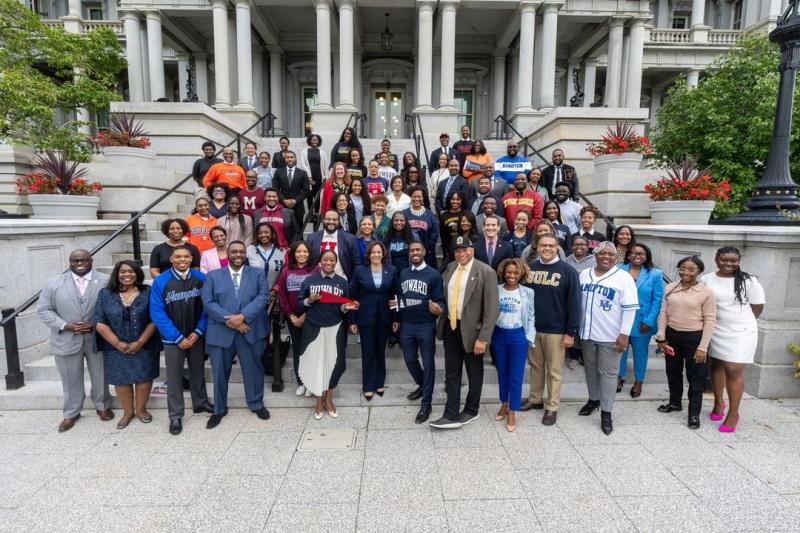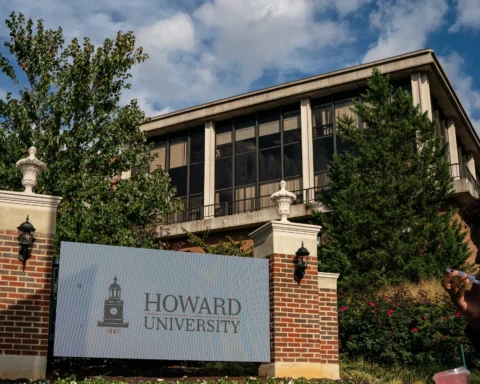By Sara Weissman
Last week, Tevon Blair went to Yard Fest—a celebratory event for freshmen at Virginia State University—armed with a tent, a table, a photo booth and games like Jenga and Connect Four. He wanted to create what felt like a block party, in hopes of energizing and informing students at the historically Black university about the voting process.
University cheerleaders performed. Members of the Divine Nine—historically Black fraternities and sororities—did signature step routines. Thousands of students turned up, according to Blair, and at least 77 registered to vote. A few dozen students even stuck around for a panel about how to engage voters in this election cycle.
Blair, an alum of Dillard University in New Orleans, is the co-founder of Xceleader, a national HBCU alumni organization started by former Student Government Association presidents that’s dedicated to encouraging student leadership. The group is partnering with HeadCount, a nonpartisan organization focused on youth voters, on an ambitious goal: mobilize 10,000 HBCU students to vote in this election cycle.
Their Say It Louder tour, part of a nonpartisan voter engagement program called Vote HBCU, is stopping at 10 campuses during welcome week or orientation events, bringing music, speakers, voter registration and workshops on voting and civic engagement. Organized with the help of Vote HBCU student fellows on each campus, the tour aims to roll voter education into the traditional fun of celebratory campus events.
“I think about the current college students today,” Blair said. “They’ve experienced the pandemic, school-shooting incidents, they’ve experienced the health-care crisis, crime, climate issues happening … and they’re finally at the age right now to make their voices heard now that they’re 18 and can vote.”
He wants to see students mobilized across HBCU campuses—not just at the big names like Howard University, Vice President Kamala Harris’s alma mater—and motivated by their own institutions’ history of educating such civil rights leaders as the Reverend Martin Luther King Jr., Stokely Carmichael, Ida B. Wells and John Lewis. When Vote HBCU talks about voter registration and engagement, Blair said, “we keep reminding the students that you walk on the same yard, the same campuses, the same halls that many of our civil rights leaders that we talk about today walked.”
Xceleader launched Vote HBCU in 2020. The alumni, a network of volunteers organized by Xceleader, started visiting campuses a year later to host what they call activations. HeadCount joined in on the effort the following year. The program, which also holds events in nonelection years, says it has registered upward of 3,000 voters since its founding. Student fellows are a new addition.
“This year, we said, ‘Hey, let’s do it big,’” Blair said.
They’re not alone. Multiple voter-registration organizations have turned their attention to HBCU students in recent years, recognizing the institutions as key players to engage young Black voters that don’t always have the resources for large-scale voter-engagement drives. And this year, of course, HBCU voters are directly in the spotlight as Harris vies for the country’s highest office. Members of the vice president’s historically Black sorority, Alpha Kappa Alpha, and other Black Greek life organizations have made headlines for ramping up efforts to galvanize voters this election season.
The Harris campaign itself is also courting these students. Glenda Glover, an Alpha Kappa Alpha member and former president of Tennessee State University, recently volunteered to be in charge of the campaign’s HBCU outreach, The Tennessean reported. Trey Baker, a senior adviser on the Harris campaign, described HBCU students and alumni to the news outlet as a “vital community of voters.” That’s been reflected in the first days of this week’s Democratic National Convention, which featured a video of the Bowie State University marching band and shots of Harris visiting North Carolina A&T State University. The junior U.S. senator from California, Laphonza Butler, also referenced her time at Jackson State University when she addressed the DNC on Monday.
The attention is welcome for organizers. Black students have voted at lower rates than white students and students over all in recent elections, noted Alberto Medina, communications team lead for the Center for Information and Research on Civic Learning and Engagement at Tufts University. In 2020, Black students’ voting rate was 63 percent, compared to 71 percent for white students, according to a report by the National Study of Learning, Voting and Engagement at Tufts.
But Black youth voter turnout, like young people’s voting rates over all, has been on the rise. Black students’ overall voting rate increased by 10 percentage points between 2016 and 2020. The upward trend has included HBCU students, whose turnout rose from 50 percent in 2016 to 63 percent in 2020. Still, HBCUs lagged behind other kinds of institutions; the voting rates at public and private doctorate-granting institutions writ large, for instance, were 70 percent and 72 percent, respectively.
Vote HBCU and other efforts are addressing a root problem, they say: lack of information about how to vote.
A 2023 analysis by the Tufts center found that nearly a fifth—17 percent—of young Black people who weren’t registered to vote in 2022 said they didn’t know how to register, had trouble with their registration or missed the deadline. Yet young Black voters were also 10 percentage points more likely than their peers to report they voted because “voting is a right.” Efforts like Vote HBCU seek to bridge the gap between how connected young Black voters feel to civic engagement and the dearth of information Black students have about how to engage.
HBCUs have a “huge potential impact” and “deserve as much or more attention as every other school in the country” when it comes to voting resources, said Alex Epstein, chief of staff at HeadCount. Recognizing that, he said organizations are “coming out of the woodwork” to register HBCU students and get them to the polls.
Growing Resources
In the past, though, HBCUs haven’t gotten that level of support.
Jen Domagal-Goldman, executive director of the ALL IN Campus Democracy Challenge, a national organization that offers incentives and support to campus voter-engagement efforts, said that minority-serving institutions, including HBCUs and community colleges, sometimes lack the infrastructure to help students register and prepare to vote.
That’s why her organization started three different “communities of practice” in 2020: one for Hispanic-serving institutions, one for community colleges and one for HBCUs. ALL IN brings faculty and staff at these institutions together to swap voter-engagement ideas with their peers. The organization offers resources like a free voter registration portal that colleges and universities can use, along with templates for students and staff to text voter information to each other.
The HBCU community of practice has now grown to about 50 HBCUs across 17 states, and they’re off to a good start, Domagal-Goldman said. The HBCUs that participated in 2020 had a voter registration rate of 86 percent, higher than the national average for student registration, which was 83 percent.
“Part of our mission is to close the gaps that persist in voter turnout and engagement across age and race,” Domagal-Goldman said. “Gen Z is the most diverse population that has reached voter age in this country, and we want our electorate to mirror that diversity.”
Epstein said smaller or lesser known HBCUs are the least likely to get the help they need to mobilize student voters. That’s why, for the Say It Louder tour, “we wanted to go to places that don’t typically get the recognition, but are just as important, just as vital, and you have just as big of a potential for impact,” he said. Along with the event at Virginia State, activations are happening at Fort Valley State University, Bethune Cookman University and Shaw University, among others.
Blair added that some of the voter registration efforts that do crop up on HBCU campuses don’t earn students’ trust. He recalled how, when he was a student at Dillard, unfamiliar organizations or campaigns would swoop on to campus during presidential election cycles to tell students to vote, or vote for a certain candidate, never to be seen again. That’s why he wants HBCU alumni doing nonpartisan voter-engagement work focused on how to vote and why it’s important, couched in HBCUs’ history—not just during presidential election years, but every year.
The 10-stop tour is an expansion of their endeavor, Blair said, but “we started in 2020, and 2021, 2022, 2023, we have been there on these campuses and supporting these students.”
He was the Student Government Association president at Dillard during the 2016 election and remembers wishing “there was an organization that was there to provide those resources, support on how I can educate my campus.”
“Everything we’re doing now … is what we wish we had eight years ago,” he said.
Anajiah Graham, a senior at Florida A&M University and a fellow, said that’s part of why she wanted to participate in Vote HBCU, because it honored HBCUs’ distinct “cultural identity.” She feels HBCU alumni and student fellows encouraging peers to vote, while discussing a shared legacy of activism, sits better with students than “people who don’t look like us” coming onto campus for the first time to tell students to vote.
“We’re able to connect with our peers better than any outsiders,” said Graham, who’s been involved in voter registration efforts since her sophomore year of high school. “We know what we need the most … We know our campuses better than anybody else.”
A ‘Shift’ in Mood
While their efforts are nonpartisan, given Xceleader is a nonprofit, Graham and others acknowledged that Harris’s elevation to the top of the Democratic ticket appears to have palpably elevated HBCU students’ enthusiasm about voting.
She and the other student fellows convened in Atlanta in late July, soon after President Joe Biden left the race, for a training and professional development event prior to the Say It Louder tour. Talking among themselves, they found they were all were seeing the same phenomenon on their campuses.
“You can immediately see a shift that’s happening,” Graham said. “You can definitely see the excitement has changed.”
Blair said he emphasizes to students, despite the buzz they’re all sensing for Harris, “it’s not your job to tell your campus community who to vote for. It’s your job to ensure they are educated.” They take it to heart, he said.
But the organizers know that Harris’s place on the presidential ballot is going to be a motivating factor. Medina, of the Center for Information and Research on Civic Learning and Engagement, noted that the only two elections in the past 50 years in which Black young people voted at higher rates than their white peers were in 2008 and 2012, when former president Barack Obama ran.
Domagal-Goldman said she sees enthusiasm ramping up. “Having a presidential candidate who for the first time is a Black woman, and for the first time is a graduate of an HBCU, I think is absolutely powerful and energizing” for these students, she said.
But excitement doesn’t always translate into votes, she cautioned. Students can be passionate about voting but get waylaid from doing so if they’re missing key information, like what counts as voter ID in the states where their campuses are or when to request absentee ballots in their home states.
“We still need to make sure that, even as there’s excitement, all of the appropriate steps are taken to make sure the students are then actually prepared to cast ballots,” she said.


